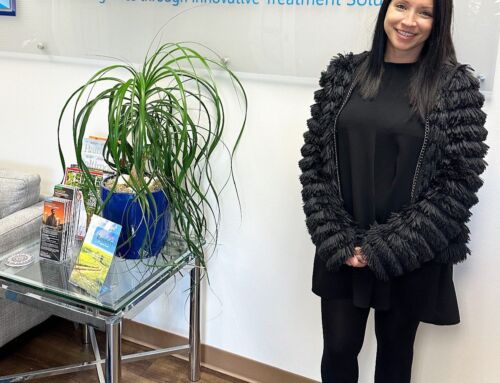The term “treatment” is used in a very broad context when discussing addiction treatment. Ask someone what “addiction treatment” is and they will typically respond with something like “going to rehab” or “therapy.” Perhaps they’ll generally speak about “individual” or “group therapy.” However, when discussing treatment for addiction, there are many specific approaches to therapy and types of evidence-based treatments that are used in the structure of a treatment program. Here are some types of treatment often found taking place in rehab or addiction treatment facilities:
Cognitive Behavior Therapy (CBT)
Cognitive Behavior Therapy, also called CBT, is a combination of talk therapy and behavioral therapy used in addiction treatment settings. This psychotherapy approach is meant to help patients reframe patterns of negative thinking into positive thought patterns. The process is to transforming a patient’s thoughts from negative to positive will then result in the patient taking positive actions and exhibiting positive behaviors, especially in difficult moments or times of crisis. Patients are taught to identify and recognize how their thinking influences their emotions and thus influences their behaviors. Patients learn coping skills and mechanisms to effectively manage their thoughts and ultimately their emotions and their behaviors.
Dialectical Behavior Therapy (DBT)
Dialectical Behavior Therapy, also called DBT, is a cognitive behavioral treatment approach that is done in individual and group therapy sessions to help patients transform negative thinking patterns and negative, destructive behaviors into positive outcomes. This treatment approach helps patients shift negative and impulsive thinking patterns into positive outcomes. DBT aids patients to regulate their emotions, build self-management skills, reduce anxiety and stress and control destructive behaviors. DBT creates a controlled environments where patients have the opportunity to practice regulating their emotions and thus managing their behaviors associated with addiction.
Motivational Interviewing (MI)
Motivational Interviewing (MI) is a psychotherapeutic approach that was developed over 30 years ago as a way to push patients past the issue of low motivation to change. The purpose of Motivational Interviewing is to help patients make positive behavioral changes to support better health by getting past feelings of ambivalence, apathy and insecurity. It allows patients to find the internal motivation they need to change their attitudes and behaviors. Therapists work with patients and encourage them to talk about their need to change and their own reasons for wanting change.
Acceptance and Commitment Therapy (ACT)
Acceptance and Commitment Therapy (ACT) is a type of psychotherapy that teaches patients mindfulness skills to help them live and behave in ways consistent with personal values while developing psychological flexibility. ACT helps patients realize and recognize ways in which their attempts to suppress, manage and control emotional experiences create challenges for them and often lead to disruptive and negative emotions, thoughts and behaviors. ACT attempts to aid patients and teach them that greater well-being can be attained by overcoming negative thoughts and feelings. It addresses a patient’s commitment to making change and what to do when they are unable to stick to their ideals or goals. ACT focuses on the three areas of 1) ACCEPT your reactions and be present 2) CHOOSE a valued direction and 3) TAKE action.
Eye Movement Desensitization and Reprocessing (EMDR)
Eye Movement Desensitization and Reprocessing, known as EMDR, is a therapeutic approach with special capacity to overcome the often devastating effects of psychological trauma. EMDR was originally designed to alleviate the distress associated with traumatic memories. EMDR is a therapeutic process that enables patients to heal from the symptoms and emotional distress of disturbing life experiences. EMDR demonstrates that the mind can heal from emotional and psychological trauma just as the body can recover from physical trauma. EMDR therapy involves attention to three time period: the past, the present and the future and attempts to aid patients in developing the skills and attitudes needed for positive future actions. As many substance use disorder patients also experience trauma, EMDR is an effective therapeutic tool in addiction treatment.
Experiential Therapy
Experiential therapy is a therapeutic approach developed in the 1970’s that encourages patients to identify and address hidden or subconscious issues through activities such as role playing, guided imagery, the use of props and a range of other active experiences. Experiential therapy can also take the form of adventure therapy, recreation therapy, equine therapy, expressive arts therapy, music therapy and wilderness therapy. This type of therapeutic approach uses one or multiple types of the above-stated therapies to re-enact and re-experience emotional situations from past and recent situations and relationships. The patient focuses on the activities and, through the experience of therapy, begins to identify emotions associated with success, disappointment, responsibility and self-esteem with the goal of learning to explore and release negative feelings, emotions, attitudes and behaviors. Experiential therapy is used often to treat both addiction and trauma, as well as eating disorders, behavior disorders, grief and loss and anger issues.
Mindfulness-Based Cognitive Therapy (MBCT)
Mindfulness-based cognitive therapy, or MBCT, is a therapeutic approach that uses cognitive behavioral therapy (CBT) methods in collaboration with Eastern psychological strategies such as mindfulness meditation. Research has shown MBCT can be extremely beneficial to substance use disorder patients in its effectiveness are reducing cravings. Mindfulness-based therapeutic practices allow patients to be aware of their thoughts, feelings and experiences in the present moment and accept them without judgment, teaching and enabling the patient to be compassionate, accepting, observant, and non-judgmental instead of habitually reacting to stressful situations, detrimental or unwanted thoughts or unpleasant feelings.
Neurofeedback
Neurofeedback, also called EEG Biofeedback, is a technological, non-invasive, drugless therapeutic method for teaching an individual’s brain to function in a more balanced and healthy way. It is basically exercise for the brain. Neurofeedback has proven effective in the treatment of addiction as well as ADHD, anxiety, depression and insomnia. Neurofeedback aids in treating the brain disorder of addiction, teaching the brain through technology how to be calm, focused and relaxed which in turn can allow a patient to think more clearly and rationally, even in stressful or triggering situations.
12 Step Facilitation
Twelve-Step Facilitation Therapy (TSF) is one of the oldest, yet evidence-based and clinically effective therapeutic approaches to addiction treatment. Based upon the 12 Steps of Alcoholics Anonymous, is a brief, structured and manual-driven therapeutic approach helpful to patients in treatment during their early recovery from substance use disorder. Twelve-Step Facilitation is grounded in the concept of alcoholism and addiction as a spiritual and medical disease and through education, workbooks and structured groups, is designed to help patients abstain from substances by systemically linking them to and encouraging their active participation in community-based 12 Step mutual help groups and fellowships. This therapeutic approach attempts to aid patients in an understanding of the 12 Steps and the concepts surrounding 12 Step recovery organizations, as well as come to self-observation and self-awareness about their own addiction issues and the solutions provided by the spiritual principles of the 12 Steps.
It is important to note that these therapeutic approaches are not the only types of therapies used in addiction treatment and that new, innovative and exciting evidence-based practices are being tested and developed. Recently, the introduction of technology support and techniques for patients both in treatment and just leaving treatment have opened up even more options for ways that addiction treatment can be beneficial and successful for patients.
If you or someone you know is in need of help because of drug and/or alcohol abuse or addiction, please give us a call. Maryland Addiction Recovery Center offers the most comprehensive dual diagnosis addiction treatment in the Mid-Atlantic area. If we aren’t the best fit for you or your loved one, we will take the necessary time to work with you to find a treatment center or provider that better fits your needs.

Table of Contents





